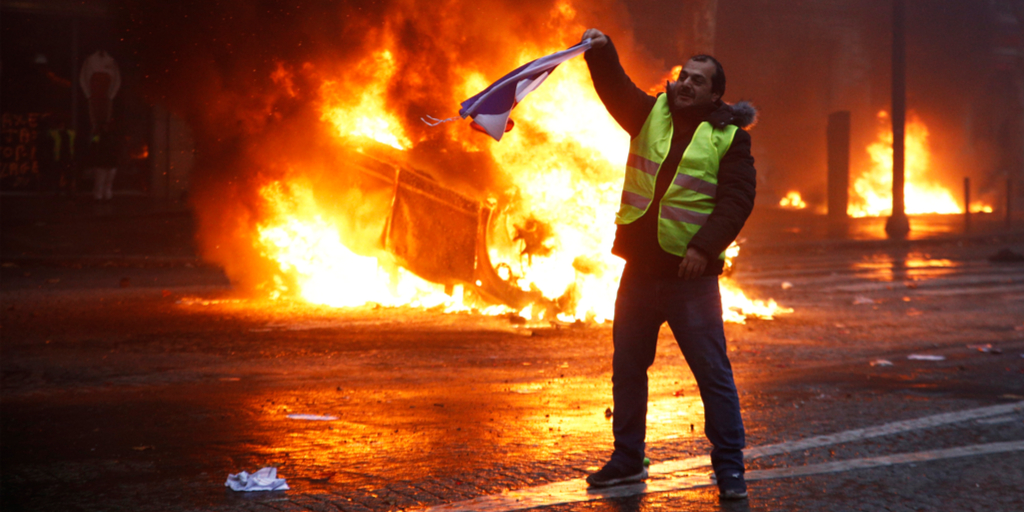Attempts to distance peoples completely from their national cultures were bound to produce unpredictable consequences.
Paris Is Burning
Since 1789, we’ve all had good reason to worry whenever riots break out in Paris. Whether it’s 1848 or 1968, social upheaval in France rarely ends well.
The sheer fury vented throughout France by the gilets jaunes movement over the past three weeks has highlighted specific grievances animating many French citizens. The truth, however, is that the burning cars, blocked highways, vandalism, lawlessness, and running battles between rioters and police in the streets are symptomatic of more formidable challenges facing France.
But what’s really disturbing is that it’s not as if France’s political leaders and many ordinary Frenchmen don’t recognize the political and economic dysfunctionalities presently weakening French society. If you look at mainstream newspapers like the center-right Le Figaro and the center-left Le Monde or glance at Francophone social media, you quickly realize that these problems are publicly debated every single day. More rarely discussed is not only why France’s politicians seem unable to address these issues but also why many French citizens won’t support long-overdue changes.
Dirigisme Rules
Some of France’s most visible problems are economic. Much of the country is, for example, being crushed by taxes. By international standards, French income tax rates are steep. There’s also a 20 percent Value Added Tax applied to most purchases that disproportionately impacts the less well-off. Altogether, the total tax burden amounts to 45.5 percent of total domestic income. Macron’s now-suspended proposal to raise fuel taxes in the name of fighting climate change turned out to be the last straw for the France that lives outside Paris’s wealthy arrondissements, where few people drive cars.
Why then are taxes so high? One reason is that government spending in France amounts to a whopping 57 percent of annual GDP. Most of this is expended on France’s burgeoning welfare state.
Another longstanding economic problem is France’s labor laws. Despite recent changes, the country’s 3,000-page Code du Travail still makes it hard to fire anyone who possesses what’s called a contrat de travail à durée indéterminée. Hence, many French businesses simply don’t bother expanding their permanent employee base. Numerous young French men and women are thus reduced to cobbling together part-time arrangements or drifting between temporary contracts. The resulting uncertainty corrodes their ability to make long-term plans, such as when to marry and have children.
For all the chatter about France being laid waste by “neoliberalism,” its large and modern economy isn’t all that free. In the heyday of economic liberalization in Europe in the 1980s and early 1990s, France never had a dynamic Thatcher-like figure. In the 2018 Index of Economic Freedom, France comes in at an unimpressive 71 out of 180 countries. In the European region, it ranks an embarrassing 34 out of 44, wedged between Montenegro and Portugal.
With the exception of mildly market-friendly reforms implemented by Charles de Gaulle in 1958 and even milder changes introduced by François Mitterrand in the early 1980s, successive French governments have long pursued dirigiste economic policies. One manifestation of this heavy government involvement in the economy is the protection and subsidization of numerous industries at French taxpayers’ expense. Much of this assistance is justified in the name of maintaining what French governments refer to as the country’s “national champions.” It’s good, the argument goes, for France to support its high-flying companies. Contemporary examples include businesses like the train-maker Alstom or the telecom equipment manufacturer Alcatel-Lucent. But if these companies are such world-beaters, why do they require endless help from the French government?
A Fake Elite
Since the 1990s, every single French president—Chirac, Sarkozy, Hollande, and now Emmanuel Macron—have sought to address France’s economic troubles by introducing some market-orientated reforms. And each time, the political pattern has been the same.
Relatively mild proposals are made to modify, for instance, welfare policy. Widespread social protests quickly ensue, strikes break out, and the ministers steering the reforms are denounced as soulless monsters. The government insists that it won’t back down, but eventually caves. Some minor changes are implemented to save face, but the status quo substantially remains.
To be fair, Macron’s economic reform agenda has yielded some accomplishments. These include introducing various business-friendly tax measures and tinkering with the labor code. He’s also less committed to the idea of national champions than his predecessors.
Time and again, however, Macron has shown himself inept at communicating his policies. One of his many recent errors was to respond to the gilets jaunes with language more characteristic of a beyond-tedious economist rather than the president of a nation with a proud history.
Indeed Macron has seemed less interested in France of late. He’s been engrossed in stunts like his recent proposal for the EU to develop its own army as a way to revive the increasingly moribund European integration project. Macron’s out-of-touch-ness, however, is typical of contemporary France’s political leaders.
Whether on the Right, center or Left, French politicians and senior government officials are an astonishingly homogenous bunch. Almost all of them have studied at the grandes écoles like the École Nationale d’Administration. These institutions serve to furnish a group of highly educated individuals. Commonly referred to as “les énarques,” they rotate between elected office, the private sector, and the state bureaucracy, thereby ostensibly lending stability to France’s notoriously cantankerous politics.
These schools produce well-trained technocrats furnished with the mindset that their primary responsibility in life is to serve the state. This is a very different attitude to that which prevails among graduates of most top-level American universities. But the grandes écoles also facilitate a monolithic outlook, an absence of creative thought, and unhealthy patronage networks.
In more recent times, these dispositions have been accompanied by a habit of embracing pretty much every politically correct nostrum. These range from gender ideology (something which infuriates large swathes of French public opinion, and not just on the Right) to environmentalism as a pseudo-religion. This has exacerbated the already huge gap between the viewpoint, life experiences, and priorities of people like Macron—whose personal career path epitomizes the énarque—and most other French people, especially the France of the provinces.
It’s telling that some of the most highly respected figures in today’s France like the former chief of staff of the French military, General Pierre de Villiers, and the new Catholic Archbishop of Paris, Michel Aupetit, are regularly presented in French media as distant from France’s politicians and technocrats. In de Villiers’ case, it helps that he resigned in protest against Macron’s 2017 defense-budget cuts. He couldn’t, de Villiers said, look his soldiers in the face while the government asked the French army to continue its already extensive commitments abroad—such as fighting Islamist terrorists in West Africa—but to do so with less money. De Villiers’ resignation showed integrity, something which few Frenchmen consider characteristic of their rulers today.
Incompatible Wants
Whenever nations can’t face up to seemingly intractable difficulties, political leaders attract the most criticism. After all, it’s their job to address systemic problems on the scale that France presently confronts but also to persuade voters why change is needed.
Yet millions of French citizens also share some responsibility for France’s problems. Put bluntly, they want to maintain a status quo characterized by incompatible political and economic preferences.
High taxes are, as we’ve seen, unpopular in France. But if you want a large welfare state, which consistently large majorities of French citizens say they do, high taxes are necessary.
The fiscal sustainability of France’s welfare state is based on the premise—similar to the United States—that each generation pays for the previous generation’s retirement. This in turn assumes that a nation will maintain, at a minimum, the replacement-level birthrate of 2.1 children per woman. At present, the French are declining to replicate themselves in sufficient numbers, presently clocking in at 1.88. Moreover, the tax-burden which pays for welfare programs reduces many French families’ willingness to have more than two children. They simply can’t afford it.
Similar contradictions distinguish a recent list of 42 demands published by representatives of the gilets jaunes. They include lowering the retirement age to 60 for all (and 55 for some!), enhanced protection for French industry, indexing all salaries to inflation, increasing the minimum wage, mandating a reduction of temporary contracts and increasing the number of permanent work contracts, nationwide rent-controls, government job-creation programs, renationalizing several utilities, and expanding social security.
What’s noticeable about these demands is the refusal to admit some basic realties: that raising, for instance, the minimum wage makes it more costly for employers to hire low-skilled workers; or that rent controls produce housing shortages; or that reducing the official retirement age will further strain the welfare system’s viability; or that maintaining France’s welfare state requires the French to have more babies.
Even more fundamentally, none of these demands addresses any of France’s core problems. Far from being revolutionaries, the gilets jaunes and their supporters throughout the country seem firmly invested in the prevailing dirigisme and the contradictory expectations that help drive it. Yes, the present unrest in France is motivated by righteous anger against a despised Paris-centric political class; but it’s also strengthened by desires to reinforce the existing but unsustainable status quo.
A Grim Future
France consequently faces an unenviable situation. Most of its political leaders are wedded to all the globalist pieties and political correctness that preoccupy Western technocrats the world over. Such virtue-signaling cuts little ice with French voters these days. Much of France’s business sector is mired in cronyism but rationalizes it as being in the national interest. And considerable numbers of the French decline to acknowledge that some things—like low taxes and big welfare states—are mutually exclusive.
Taken together, these trends suggest a worrisome future for France: one characterized by deepening social and economic fissures, aversion to reality, and politicians who oscillate between pursuing supranational utopianism or settling for managed decline. Unlike 1958—the year in which the Fourth Republic disintegrated—there’s no de Gaulle waiting in the wings with the strategic vision, political skills, willpower, and above all, sheer prestige, to lead a fractious France in a healthier direction.
In crisis, the cliché goes, we discover opportunity. France today appears to be proving the opposite.



